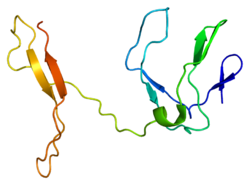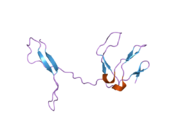RELB
Transcription factor RelB is a protein that in humans is encoded by the RELB gene.[5]
Interactions
RELB has been shown to interact with NFKB2,[6][7] NFKB1,[6] and C22orf25.[8]
Activation and Function
In resting cells, RelB is sequestered by the NF-κB precursor protein p100 in the cytoplasm. A select set of TNF-R superfamily members, including lymphotoxin β-receptor (LTβR), BAFF-R, CD40 and RANK, activate the non-canonical NF-κB pathway. In this pathway, NIK stimulates the processing of p100 into p52, which in association with RelB appears in the nucleus as RelB:p52 NF-κB heterodimers. RelB:p52 activates the expression homeostatic lymphokines,[9] which instruct lymphoid organogenesis and determine the trafficking of naive lymphocytes in the secondary lymphoid organs.
Recent studies suggested that the function the non-canonical NF-κB pathway is modulated by canonical NF-κB signalling. For example, syntheses of the constituents of the non-canonical pathway, viz RelB and p52, are controlled by canonical IKK2-IκB-RelA:p50 signalling.[10] Moreover, generation of canonical and non-canonical dimers, viz RelA:p50 and RelB:p52, within the cellular milieu are mechanistically interlinked. These analyses suggest that an integrated NF-κB system network underlies activation of both RelA and RelB containing dimer and that a malfunctioning canonical pathway will lead to an aberrant cellular response also through the non-canonical pathway.
Most intriguingly, a recent study identified that TNF-induced canonical signalling subverts non-canonical RelB:p52 activity in the inflamed lymphoid tissues limiting lymphocyte ingress.[11] Mechanistically, TNF inactivated NIK in LTβR‐stimulated cells and induced the synthesis of Nfkb2 mRNA encoding p100; these together potently accumulated unprocessed p100, which attenuated the RelB activity. A role of p100/Nfkb2 in dictating lymphocyte ingress in the inflamed lymphoid tissue may have broad physiological implications.
See also
References
- ^ a b c GRCh38: Ensembl release 89: ENSG00000104856 – Ensembl, May 2017
- ^ a b c GRCm38: Ensembl release 89: ENSMUSG00000002983 – Ensembl, May 2017
- ^ "Human PubMed Reference:". National Center for Biotechnology Information, U.S. National Library of Medicine.
- ^ "Mouse PubMed Reference:". National Center for Biotechnology Information, U.S. National Library of Medicine.
- ^ Bours V, Burd PR, Brown K, Villalobos J, Park S, Ryseck RP, et al. (February 1992). "A novel mitogen-inducible gene product related to p50/p105-NF-kappa B participates in transactivation through a kappa B site". Molecular and Cellular Biology. 12 (2): 685–95. doi:10.1128/MCB.12.2.685. PMC 364259. PMID 1531086.
- ^ a b Bouwmeester T, Bauch A, Ruffner H, Angrand PO, Bergamini G, Croughton K, et al. (February 2004). "A physical and functional map of the human TNF-alpha/NF-kappa B signal transduction pathway". Nature Cell Biology. 6 (2): 97–105. doi:10.1038/ncb1086. PMID 14743216. S2CID 11683986.
- ^ Thornburg NJ, Pathmanathan R, Raab-Traub N (December 2003). "Activation of nuclear factor-kappaB p50 homodimer/Bcl-3 complexes in nasopharyngeal carcinoma". Cancer Research. 63 (23): 8293–301. PMID 14678988.
- ^ "Molecular Interaction Database". Archived from the original on 2006-05-06.
- ^ Bonizzi G, Bebien M, Otero DC, Johnson-Vroom KE, Cao Y, Vu D, et al. (October 2004). "Activation of IKKalpha target genes depends on recognition of specific kappaB binding sites by RelB:p52 dimers". The EMBO Journal. 23 (21): 4202–10. doi:10.1038/sj.emboj.7600391. PMC 524385. PMID 15470505.
- ^ Basak S, Shih VF, Hoffmann A (May 2008). "Generation and activation of multiple dimeric transcription factors within the NF-kappaB signaling system". Molecular and Cellular Biology. 28 (10): 3139–50. doi:10.1128/MCB.01469-07. PMC 2423155. PMID 18299388.
- ^ Mukherjee T, Chatterjee B, Dhar A, Bais SS, Chawla M, Roy P, et al. (December 2017). "A TNF-p100 pathway subverts noncanonical NF-κB signaling in inflamed secondary lymphoid organs". The EMBO Journal. 36 (23): 3501–3516. doi:10.15252/embj.201796919. PMC 5709727. PMID 29061763.
Further reading
- Taylor JP, Pomerantz R, Bagasra O, Chowdhury M, Rappaport J, Khalili K, Amini S (September 1992). "TAR-independent transactivation by Tat in cells derived from the CNS: a novel mechanism of HIV-1 gene regulation". The EMBO Journal. 11 (9): 3395–403. doi:10.1002/j.1460-2075.1992.tb05418.x. PMC 556874. PMID 1505523.
- Ruben SM, Klement JF, Coleman TA, Maher M, Chen CH, Rosen CA (May 1992). "I-Rel: a novel rel-related protein that inhibits NF-kappa B transcriptional activity". Genes & Development. 6 (5): 745–60. doi:10.1101/gad.6.5.745. PMID 1577270.
- Liu J, Perkins ND, Schmid RM, Nabel GJ (June 1992). "Specific NF-kappa B subunits act in concert with Tat to stimulate human immunodeficiency virus type 1 transcription". Journal of Virology. 66 (6): 3883–7. doi:10.1128/JVI.66.6.3883-3887.1992. PMC 241175. PMID 1583734.
- Biswas DK, Salas TR, Wang F, Ahlers CM, Dezube BJ, Pardee AB (December 1995). "A Tat-induced auto-up-regulatory loop for superactivation of the human immunodeficiency virus type 1 promoter". Journal of Virology. 69 (12): 7437–44. doi:10.1128/JVI.69.12.7437-7444.1995. PMC 189681. PMID 7494249.
- Jeang KT, Chun R, Lin NH, Gatignol A, Glabe CG, Fan H (October 1993). "In vitro and in vivo binding of human immunodeficiency virus type 1 Tat protein and Sp1 transcription factor". Journal of Virology. 67 (10): 6224–33. doi:10.1128/JVI.67.10.6224-6233.1993. PMC 238044. PMID 7690421.
- Alcamí J, Laín de Lera T, Folgueira L, Pedraza MA, Jacqué JM, Bachelerie F, et al. (April 1995). "Absolute dependence on kappa B responsive elements for initiation and Tat-mediated amplification of HIV transcription in blood CD4 T lymphocytes". The EMBO Journal. 14 (7): 1552–60. doi:10.1002/j.1460-2075.1995.tb07141.x. PMC 398242. PMID 7729429.
- Majello B, De Luca P, Hagen G, Suske G, Lania L (November 1994). "Different members of the Sp1 multigene family exert opposite transcriptional regulation of the long terminal repeat of HIV-1". Nucleic Acids Research. 22 (23): 4914–21. doi:10.1093/nar/22.23.4914. PMC 523756. PMID 7800480.
- Taylor JP, Pomerantz RJ, Oakes JW, Khalili K, Amini S (January 1995). "A CNS-enriched factor that binds to NF-kappa B and is required for interaction with HIV-1 tat". Oncogene. 10 (2): 395–400. PMID 7838536.
- Westendorp MO, Shatrov VA, Schulze-Osthoff K, Frank R, Kraft M, Los M, et al. (February 1995). "HIV-1 Tat potentiates TNF-induced NF-kappa B activation and cytotoxicity by altering the cellular redox state". The EMBO Journal. 14 (3): 546–54. doi:10.1002/j.1460-2075.1995.tb07030.x. PMC 398112. PMID 7859743.
- Scala G, Ruocco MR, Ambrosino C, Mallardo M, Giordano V, Baldassarre F, et al. (March 1994). "The expression of the interleukin 6 gene is induced by the human immunodeficiency virus 1 TAT protein". The Journal of Experimental Medicine. 179 (3): 961–71. doi:10.1084/jem.179.3.961. PMC 2191426. PMID 8113688.
- Bours V, Azarenko V, Dejardin E, Siebenlist U (June 1994). "Human RelB (I-Rel) functions as a kappa B site-dependent transactivating member of the family of Rel-related proteins". Oncogene. 9 (6): 1699–702. PMID 8183565.
- Deloukas P, Dauwerse JG, van Ommen GJ, van Loon AP (February 1994). "The human NFKB3 gene encoding the p65 subunit of transcription factor NF-kappa B is located on chromosome 11q12". Genomics. 19 (3): 592–4. doi:10.1006/geno.1994.1115. PMID 8188306.
- Westendorp MO, Li-Weber M, Frank RW, Krammer PH (July 1994). "Human immunodeficiency virus type 1 Tat upregulates interleukin-2 secretion in activated T cells". Journal of Virology. 68 (7): 4177–85. doi:10.1128/JVI.68.7.4177-4185.1994. PMC 236340. PMID 8207793.
- Dobrzanski P, Ryseck RP, Bravo R (March 1993). "Both N- and C-terminal domains of RelB are required for full transactivation: role of the N-terminal leucine zipper-like motif". Molecular and Cellular Biology. 13 (3): 1572–82. doi:10.1128/MCB.13.3.1572. PMC 359469. PMID 8441398.
- Harhaj E, Blaney J, Millhouse S, Sun SC (February 1996). "Differential effects of I kappa B molecules on Tat-mediated transactivation of HIV-1 LTR". Virology. 216 (1): 284–7. doi:10.1006/viro.1996.0062. PMID 8615004.
- Conant K, Ma M, Nath A, Major EO (March 1996). "Extracellular human immunodeficiency virus type 1 Tat protein is associated with an increase in both NF-kappa B binding and protein kinase C activity in primary human astrocytes". Journal of Virology. 70 (3): 1384–9. doi:10.1128/JVI.70.3.1384-1389.1996. PMC 189957. PMID 8627654.
- Demarchi F, d'Adda di Fagagna F, Falaschi A, Giacca M (July 1996). "Activation of transcription factor NF-kappaB by the Tat protein of human immunodeficiency virus type 1". Journal of Virology. 70 (7): 4427–37. doi:10.1128/JVI.70.7.4427-4437.1996. PMC 190376. PMID 8676466.
- Beauparlant P, Kwon H, Clarke M, Lin R, Sonenberg N, Wainberg M, Hiscott J (September 1996). "Transdominant mutants of I kappa B alpha block Tat-tumor necrosis factor synergistic activation of human immunodeficiency virus type 1 gene expression and virus multiplication". Journal of Virology. 70 (9): 5777–85. doi:10.1128/JVI.70.9.5777-5785.1996. PMC 190591. PMID 8709193.
- Ramazzotti E, Vignoli M, Re MC, Furlini G, La Placa M (May 1996). "Enhanced nuclear factor-kappa B activation induced by tumour necrosis factor-alpha in stably tat-transfected cells is associated with the presence of cell-surface-bound Tat protein". AIDS. 10 (5): 455–61. doi:10.1097/00002030-199605000-00002. PMID 8724035. S2CID 84476590.








